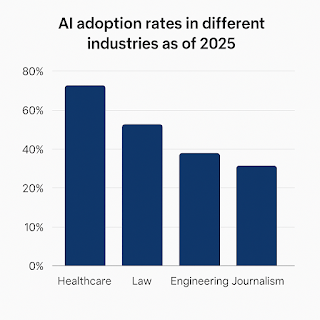Will AI Replace Doctors? The Future of Healthcare in the Age of AI
- Get link
- X
- Other Apps
Will AI Replace Doctors? The Future of Healthcare in the Age of AI
Introduction: Can AI Replace Doctors?
AI and doctors working together in a modern healthcare setting
The rise of artificial intelligence in healthcare has sparked widespread
debate. Will AI replace doctors, or will it serve as an indispensable tool to
enhance medical care?
As AI-powered systems become more advanced—handling tasks like medical
imaging analysis, diagnosis, and even robotic surgeries—many fear that doctors
might become obsolete. However, the human touch, ethical judgment, and
emotional intelligence remain irreplaceable.
In this article, we’ll explore:
✅ What AI can and cannot do in healthcare
✅ Why human doctors are still essential
✅ Insights from experts like Bill Gates on AI’s role in medicine
✅ How AI is transforming multiple industries
By the end, you’ll understand why the future of medicine is not about AI
vs. doctors, but rather AI + doctors working together.
1. AI vs. Human Doctors: What Can AI
Really Do?
AI has made significant strides in healthcare. Here are some areas where
AI outperforms human doctors:
Table 1: How AI Is Used in Healthcare
|
AI Application |
How It Helps |
Example |
|
Medical Imaging |
AI scans X-rays & MRIs faster than humans |
Google’s AI detects lung cancer with 94% accuracy |
|
Predictive
Diagnostics |
AI predicts diseases before symptoms
appear |
IBM Watson Health assists in early
cancer detection |
|
Robotic Surgery |
AI enhances precision in complex surgeries |
Da Vinci Surgical System aids in heart surgeries |
|
Drug Discovery |
AI accelerates the development of
new drugs |
DeepMind’s AlphaFold predicts
protein structures |
🔹 Key Takeaway: AI is exceptional
at data analysis, pattern recognition, and automation, but it lacks
intuition, ethical reasoning, and emotional intelligence.
📊 Source: McKinsey & Company: AI in Healthcare
2. Why AI Won’t Replace Doctors
Anytime Soon
While AI can assist in diagnostics and treatments, it cannot replace
doctors for several reasons:
Table 2: Why Doctors Are Still
Essential
|
Human Skill |
Why AI Can’t Replace It |
Example |
|
Empathy & Emotional Support |
AI lacks human compassion |
Comforting a patient with a terminal illness |
|
Complex
Decision-Making |
AI struggles with ethical dilemmas |
Deciding whether to operate on a
high-risk patient |
|
Personalized Treatment Plans |
AI can’t consider social & psychological factors |
Adjusting treatments based on a patient’s unique needs |
|
Trust & Human
Interaction |
Patients prefer human doctors |
A 2024 Johns Hopkins study found
patients trust human doctors 68% more for complex diagnoses |
🔹 Key Takeaway: AI should be
viewed as a powerful assistant, not a replacement for human
doctors.
📊 Source: Johns Hopkins Study on AI and Patient Trust
3. Bill Gates on AI: A Tool for
Doctors, Not a Replacement
Tech visionary Bill Gates has spoken extensively on AI’s role in
healthcare. In a 2023 keynote, he stated:
"AI can process data faster than any human, but it cannot replace
the compassion of a nurse or the intuition of a surgeon. The future lies in
collaboration—not competition."
Gates believes AI can help address doctor shortages, especially in
rural areas, but warns against over-reliance on AI for critical
decisions.
📌 Key Takeaway: AI should be
seen as a tool to support doctors, not replace them.
📊 Source: Bill
Gates on AI in Healthcare
4. AI in Other Industries: The Human
Factor Still Matters
AI is transforming multiple industries, but human expertise remains
crucial in many sectors.
Table 3: AI’s Impact Across Industries
|
Industry |
How AI Is Used |
Why Humans Are Still Needed |
|
Healthcare |
AI assists in diagnostics & drug discovery |
Doctors provide emotional support & ethical judgment |
|
Law |
AI drafts contracts & analyzes
legal cases |
Lawyers interpret complex laws &
negotiate settlements |
|
Engineering |
AI optimizes designs & runs simulations |
Engineers solve real-world problems creatively |
|
Journalism |
AI generates news articles |
Investigative journalists apply critical
thinking |
📊 Source: McKinsey
Global Institute: AI Trends 2025
 |
| AI adoption rates in different industries as of 2025 |
5. Ethical Concerns: Can We Trust AI
in Medicine?
Public perception of AI in healthcare is mixed:
📊 Survey Results (Pew Research
2025):
- 52% of Americans worry about AI misdiagnoses
- 48% believe AI reduces medical
errors
To build public trust, AI in medicine must prioritize transparency,
accountability, and ethical considerations.
📊 Source: Pew Research Center AI in Healthcare
Conclusion: The Future of AI in
Healthcare
AI won’t replace doctors, but it will transform medicine
by:
✅ Enhancing diagnostics & precision medicine
✅ Reducing medical errors
✅ Assisting doctors in high-pressure situations
However, human expertise, ethical judgment, and empathy remain
irreplaceable. The future of healthcare lies in a collaborative
model where AI and doctors work together to provide the best patient
care.
As Bill Gates wisely said:
"The best outcomes arise when we pair machine speed with human
wisdom."
📌 Resources &
Further Reading
📌 IBM Watson Health: https://www.ibm.com/watson-health
📌 DeepMind AlphaFold: https://deepmind.google/discover/blog/alphafold-a-quantum-leap-in-protein-structure-prediction/
📌 McKinsey AI Report (2025): https://www.mckinsey.com/ai-trends-2025
🔔 What do you think? Will AI
revolutionize medicine or should we be cautious? Share your thoughts below!
- Get link
- X
- Other Apps




Comments
Post a Comment